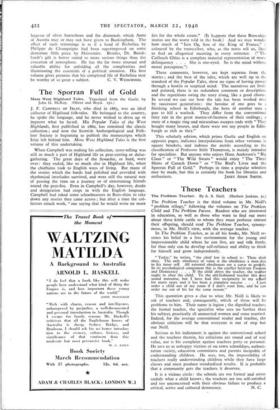These Teachers
" problem trilogy," following the volumes on The Problem Child and The Problem Parent. Readers who are interested
in education, as well as those who want to find out more about these kittle cattle to whom they must perforce entrust
their offspring, should read The Problem Teacher, synony- mous, in Mr. Neill's view, with the average teacher.
In The Problem Teacher, as in all his books, Mr. Neill re- states his belief in a free environment for the young and impressionable child where he can live, act and talk freely,
for thus only can he develop self-reliance and ability to think for himself and grow independently.
" Today," he writes, " the chief law in school is: Thou shalt obey. The only obedience of value is the obedience a man has to his inner self. All external obediences are a curse to gro th. In its psychological component this is the conflict bettnen Fas ism and Democracy . . . If the child obeys the teacher, the tea her ought to obey the child. To the old-fashioned teacher this ay sound nonsense, but I have had this reciprocity in my s ool for many years and it has been a complete success . . . I can order a child out of my room if I don't want him, and he can order me out of his for the same reason."
This quotation gives a clue to what Mr. Neill is likely to ask of teachers and, consequently, which of them will be problems to him. Their name is legion ; the dignified teacher, the formal teacher, the specialist who sees no further than his subject, practically all unmarried women and some married. Indeed, for the average conventional reader and teacher, the obvious criticism will be that everyone is out of step but our Neill.
Serious as his indictment is against the conventional school and the teachers therein, his criticisms are sound and of real value, nor is his complaint against teachers petty or personal.
He sees us as unhappy victims of ou rown schooldays, authori- tarian :ociety, education committees and parents incapable of understanding children. He sees, too, the impossibility of teachers really understanding children while they have large classes and must produce standardised results. It is probable that a community gets the teachers it deserves.
It is a vicious circle: the schools are too formal and stress unduly what a child knows ; the teachers are too self-satisfied and too unconcerned with their obvious failure to produce a critical, active and cultured democracy. N. C.






































 Previous page
Previous page